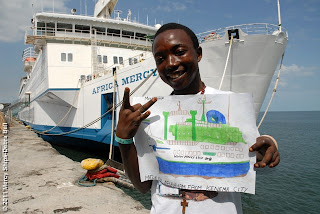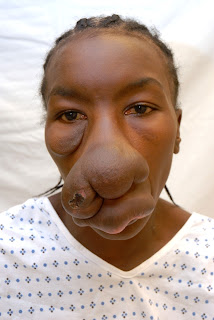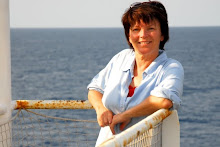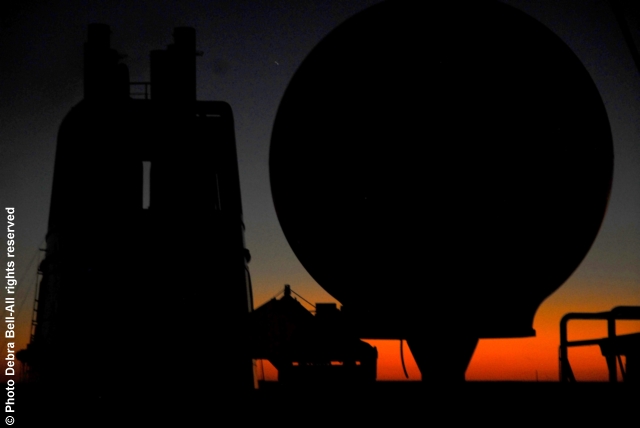Sheku Conteh
Sheku Conteh is a valued member of the Africa Mercy’s Engineering Team. He is well-respected as a man of great integrity, who has overcome great obstacles to live his dreams. He treasures every blessing in his life as a gift from God.
Reflecting upon the dramatic changes in his life, Sheku gazes thoughtfully at the sea. Then his gaze becomes more intent as he says, “To understand what has happened to me, you need to know my story.”
His story starts in Sierra Leone in 2002, after the war. A boil appeared on his face. His mother prayed for him daily while cooking African herbs to make an ointment which she gently pressed onto his wound. But his condition worsened.
Eventually the growth developed into a facial tumor. With each day, it became more challenging for Sheku to lead a normal life in his community, where such deformities are viewed with distrust and fear.
To make life even more difficult during the next year, violence erupted again. Many atrocities occurred, and Sheku’s home was burned down by rebels. He and his family went to live in a camp, and as time passed, the plastic shelter became home for them.
In 2002, Sheku passed by a Mercy Ships local office on his way home from school. A day-volunteer ran into the street and called to him, “What is wrong with you?” Sheku was initially quite stunned by this sudden outburst. However, within minutes, he was offered an opportunity that would save his life. He was presented with an appointment card to visit Mercy Ships when the hospital ship, the Anastasis, arrived. Although the ship’s exact arrival date was unconfirmed, he went home with a newfound hope that gave him the determination to attend school in spite of the taunts he endured from other students.
During 2002, Sheku’s health deteriorated until one day he was rushed to the hospital with pain and respiratory difficulties. There was nothing they could do for him. His only option was to pray for Mercy Ships to arrive quickly – to save his life. He was only 14 years old.
Finally, he heard the long-anticipated radio announcement – the hospital ship had arrived in Freetown to offer free surgeries!
On the day of the medical screening, Sheku awoke very early, while it was still dark. At the stadium his mother held him close as they stood in line. Unexpectedly, they were taken straight to the doctors for diagnosis. To their surprise, Sheku was offered treatment. It was hard to comprehend that his time for healing had arrived. He felt apprehensive and insecure, without any strong foundation of faith to calm him.
During Sheku’s medical assessment, he noticed a Mercy Ships volunteer watching him. Sheku recalls, “I was so angry to be stared at.” Little did Sheku know that this man would be the catalyst for radical changes in his life.
Not long afterward, Sheku heard a man shouting his name in the street. He cautiously ventured outside. It was Chris, the man who had ignited his anger during the screening. Sheku exclaimed to his mother, “Someone is coming for me!”
As Chris learned more about Sheku’s journey to find treatment, he soon became a regular visitor to Sheku’s home. A wonderful benefit of this attention was that the local bullies were very impressed by the white man’s friendship for Sheku and quit mistreating the boy.
In the following weeks, Sheku’s pain increased. He prayed that his life would be spared long enough for him to receive the operation from Mercy Ships. He silently hid in his house – afraid that if he ventured outside, someone would use witchcraft to curse him and hasten his death.
Ironically, on New Year’s Day in 2003 – a day that usually symbolizes hope for the future year – Sheku sat quivering with anxiety and pain. He sadly recalls, “I was feeling pain. Praying. Nervous about having surgery, in case I did not survive.”
Mercy Ships volunteer surgeons successfully removed the core of the massive tumor. The surgery also freed Sheku from his fear of imminent death. He realized that he actually had a future! His new friend Chris decided to brighten that future by sponsoring Sheku’s school attendance until he was 16 years old.
Time flew by, and in 2004 Mercy Ships returned to Sierra Leone. Sheku enjoyed seeing his friend Chris again. After visiting the plastic shelter that was still serving as home for Sheku and his family, Chris purchased housing for them and provided funding for the young man to continue his education.
After thoughtful consideration of his discussions with Chris, Sheku put his faith to the test by attending the Discipleship Training School (DTS) in Ghana in 2009. This radically transformed his uncertainty into a deep, reassuring faith. He reminisces, “It was really great. I became closer to God. I could see God working.”
By the end of his training, the global economy was in a slump. However, Chris continued to support Sheku. One day, Chris asked Sheku, “What do you want to do with your life now?” Sheku wanted to attend college to study medicine. Chris investigated a more feasible option – working onboard the hospital ship in Engineering with Chief Engineer, Andy Cole. This work was due to start very soon. In light of this new option, Sheku fervently prayed throughout the night. The next morning he received a golden opportunity. Blinking in disbelief, he read an email offering him a six-month job as a day-volunteer in engineering onboard the Africa Mercy in Togo!
Sheku embraced the God-sent opportunity. He left his family’s home to live on his own for the first time, with Chris graciously supplying the accommodation. And, for the first time, Sheku was really living by faith. He worked diligently, declaring, “It’s all in the heart and attitude.”
Opportunities continued to unfold. After only two months, he was offered an apprenticeship as an engine hand with Mercy Ships. This was the launch of his career.
Next, Sheku had his long-awaited final surgery – the Iliac Crest Bone Graft (ICBG) procedure. There was no longer any trace of his disfigurement! By December 2010, Sheku’s onboard training had been completed and certified by the Engineering Department. The 21-year-old was promoted to Motor Man onboard the Africa Mercy.
Sheku has come a long way since he first met Mercy Ships. He reflectively comments, “One day I dreamt I might come back to work with Mercy Ships if I’m rich and retired … now I’m aiming to be an engineering officer aboard the ship.” He has also helped his family to build their own home on a plot of land provided by Chris.
To a large degree, Sheku attributes his successes to the continuing loyal support and guidance from Chris and Mercy Ships. However, ultimately, the most dramatic change in his life came from his willingness to follow Jesus. He declares, “I have this important message. My testament in faith will bring hope to transform lives and bring people to Mercy Ships. God is with us at all times – and with this knowledge, hope will come to fruition.”
Story by Claire Ross























































































